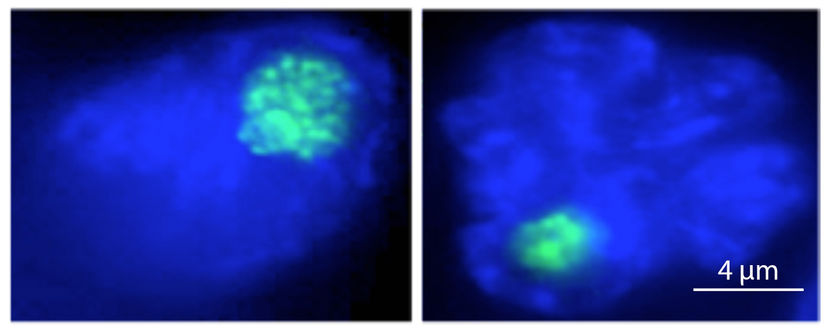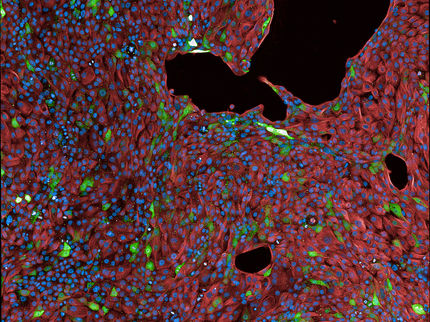Size matters
Size of nucleolus plays an important role in protecting cells against infection
All cells in the body have the basic ability to protect themselves from infection, called the innate immune response. But how cells do this is not very well understood. Recently, scientists from the Max Planck Institute for Biology of Ageing and the University of Cologne, found that the size of the nucleolus plays an important role in protecting cells against infection.

The nucleolus (in green) of macrophage cells shrinks upon bacterial infection (left: uninfected macrophage, right: bacteria infected macrophage)
©Max Planck Institute for Biology of Ageing
The nucleolus is a small organelle present in the nucleus of cells, which regulates physiologic processes such as growth and stress responses. Scientists from Cologne discovered that upon bacterial infection, the nucleolus shrinks in size, revealing a remarkable visible change as part of the host response. But how might nucleolar reduction combat infection?
Prof. Antebi from the Max Planck Institute for Biology of Ageing in Cologne notes that “the nucleolus contains a protein highly conserved in evolution called fibrillarin, which also decreases during infection. When we reduce fibrillarin in the nucleolus it is sufficient to defend against bacterial infection.” On the other hand, Antebi and his colleagues could show that activities that expand the nucleolus and increase fibrillarin make cells more sensitive to infection. In collaboration with Dr. Robinson’s lab at the University of Cologne, they have furthermore shown that this is true of cells from tiny round worms all the way up to mammals including human cells.
The scientists believe that the bacterial killing activity of the nucleolus and fibrillarin upon bacterial infection may be related to their function in producing ribosomes, miniature factories that make the proteins of the cell. When ribosome activity is decreased, cells put more effort into fighting bacteria and decreasing inflammation.
Interestingly, Antebi’s lab previously found that reduced nucleolar size and fibrillarin reduction are linked with longer life in different species. Prof. Antebi therefore speculates that perhaps reduced nucleolar size may prolong life through the balanced control of the innate immune response. These studies may provide new ways to stimulate the cells natural defense response and promote health.
Original publication
Varnesh Tiku, Chun Kew, Parul Mehrotra, Raja Ganesan, Nirmal Robinson, Adam Antebi; "Nucleolar fibrillarin is an evolutionarily conserved regulator of bacterial pathogen resistance"; Nature Communications; 2018.
Original publication
Varnesh Tiku, Chun Kew, Parul Mehrotra, Raja Ganesan, Nirmal Robinson, Adam Antebi; "Nucleolar fibrillarin is an evolutionarily conserved regulator of bacterial pathogen resistance"; Nature Communications; 2018.
Organizations
Other news from the department science

Get the life science industry in your inbox
By submitting this form you agree that LUMITOS AG will send you the newsletter(s) selected above by email. Your data will not be passed on to third parties. Your data will be stored and processed in accordance with our data protection regulations. LUMITOS may contact you by email for the purpose of advertising or market and opinion surveys. You can revoke your consent at any time without giving reasons to LUMITOS AG, Ernst-Augustin-Str. 2, 12489 Berlin, Germany or by e-mail at revoke@lumitos.com with effect for the future. In addition, each email contains a link to unsubscribe from the corresponding newsletter.



















































